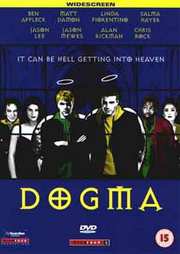Review of Dogma
Introduction
When it comes to polite conversation, topics traditionally to be avoided are death, taxes and religion. I`ve never really understood the taxes bit, everyone hates paying them, and the odds that you`ll be chatting with an employee of the Inland Revenue are pretty small, so it`s only a small risk of causing offence. But religion is a whole other matter. Nothing divides people as much as the thorny topic of faith, the risk of causing offence certainly merits caution even when talking around the subject. The representation of faith in media is an even more thorny matter. The traditional take has been to offer a faithful (no pun intended) representation of religious material, from whatever denomination or source. Events like the nativity, re-enacted in primary schools the length and breadth of Britain, to the epic films of the golden era of Hollywood are less stories than they are parables. These films were not about characterisation or imagination, but were made with the source material treated unsurprisingly as gospel. For many people they serve as an affirmation of their faith, a means of making a pilgrimage without leaving their living room, or by travelling only as far as the local cinema. It`s no surprise that the Mahabharat series led to television sets throughout India becoming shrines.
On the other hand, media can also be used to explore, innovate, challenge and provoke debate. People have always been questioning their faith, and naturally some people would try and do this in media. Of course the line between questioning faith and causing offence is an elusive thing to pin down, as Salman Rushdie found out when he published The Satanic Verses. Similarly in cinema, making a religious film that innovates, questions and tries to tell a story rather than a parable runs the risk of causing offence and often generates extreme controversy. The Last Temptation of Christ caused much condemnation, as did Monty Python`s Life of Brian. On the other hand Mel Gibson`s Passion of The Christ attempted to do both, by remaining faithful to its source, yet attempting a previously unimagined realism by having the dialogue spoken in Aramaic and Latin. While audiences filled the cinema in droves, it still managed to cause offence to some. Clearly, attempting to challenge established doctrine involves risking one`s reputation, if not one`s life.
When director Kevin Smith decided to explore his Catholic faith through the View Askewniverse, introducing Jay and Silent Bob to God, controversy was pretty much a given. Dogma pretty much goes out of its way to court controversy too, picking at the basic tenets of Catholicism with a healthy dose of irreverence. Naturally if you feel strongly about your faith, this may not be the film for you.
For disobeying the word of God, the angels Loki and Bartleby were exiled to Earth for all eternity, where they have languished ever since. Then an opportunity arises for them to return to heaven through a rarely mentioned piece of Catholic dogma. A ceremony at a church in New Jersey will absolve them of their sins, and let them return to heaven. They don`t know though, that by doing so, they will prove God fallible, and in doing so unmake existence itself. It falls to Bethany Sloane, the last Scion to save existence. At least that is what she is told by the Seraph Metatron when he appears in a ball of flame in her bedroom. He also tells her that two prophets will help her, and it`s not too long after that Jay and Silent Bob enter her life. Soon they are on their way to New Jersey to stop the ceremony, and on their way, the 13th Apostle and the muse Serendipity will meet them. Trying to stop them are the demon Azrael and his Stygian triplets, and meanwhile God is missing in action.

Video
Dogma is presented in a 2.35:1 anamorphic transfer. The transfer gives little reason to complain. The image is clear, sharp and well defined. The colours are strong. There are a couple of flecks on the print, a hint of grain, and some minor jaggies. Other than that the image is perfectly acceptable.

Audio
Similarly the English DD 5.1 Surround track does a fine job in conveying the action and music. The dialogue is clear throughout, although the Excremental sounds a little muffled in that rather odious suit. The disc menu promises a Dolby Surround track but only the DD 5.1 exists on the disc. English subtitles are provided for the feature.

Features
The extras are limited to the Theatrical Trailer, Teaser Trailer and a couple of TV spots. However there is a collection of interviews with Kevin Smith, Linda Fiorentino, Ben Affleck and Salma Hayek about the movie running for a total of 22 minutes. Unfortunately there are no subtitles for this rather poor footage, doubly infuriating, as the German interviewer is almost incomprehensible.

Conclusion
My faith, or lack thereof has always been a very personal matter to me, I tend to avoid organised religion and try to muddle my own way through. Consequently, this film was preaching to the converted in my case, and I found Dogma to be thought provoking, entertaining and highly enjoyable. On the surface it can appear to be a tirade against religion in modern society, and its irreverent style and sly mockery would be something that could aggravate people, but underlying this is a strong spiritual message that strikes a very personal chord. While Dogma isn`t about converting people to the cause, or acting as a spiritual security blanket, it did leave me with a strong sense of hope, something most traditional religious epics usually fail to do.
Dogma takes a long hard look at nearly all aspects of organised religion, and proceeds to pick them apart with tongue firmly in cheek. A disenfranchised Church tries to reinvent itself to appeal to the masses, with a Catholicism Wow! banner and a new icon, the Buddy Christ to remove the depressing overtones of the crucifixion. The Christ explored in Dogma turns out not to be the blond haired and blue-eyed Messiah of the movies, understandable given his origins in the Middle East, and while his conception may have been immaculate, that doesn`t discount siblings or descendants, hence Bethany as played by Linda Fiorentino, turns out to be the last Scion of Christ. By accident of birth it falls to her to save creation, but naturally her own faith has lapsed. It`s her mission, and the fantastical beings she encounters, Angels and Seraphim as well as unlikely Prophets that lead her back to her own spirituality, and by an unlikely path as well. Most of the ranting and railing against dogma, the picking of holes in blind faith is actually done by the fallen angels of death Bartleby and Loki, played by Ben Affleck and Matt Damon, as they head towards redemption leaving mayhem in their wake. Indeed one of their encounters with the board of Mooby, a company with the combined aspect of Disney and McDonalds is particularly enjoyable to watch, although it is a little tangential to the plot and seems to be an indulgence on the part of the director. I suppose it could signify humanity`s collective fall from grace.
One of the more entertaining characters is Chris Rock`s Rufus, the thirteenth Apostle, left out of the Bible because he was black. It gives Chris Rock to indulge his angry routine, and he neatly points out the shortcomings of a religious text written years after the fact. It also Rock`s character who nails the whole point of the film, the difference between ideas and belief, and it`s a line that proves powerfully resonant. For after years and centuries of dogma, words can become altered and distorted, their relevance changed with society, until the ideas behind those words become distorted and even obliterated.
While Dogma takes the minutiae of faith and treats it with a healthy disrespect, the spirituality at the heart of the film is strong and resplendent. The faith and belief that motivated this film is evident in each frame. While the characters in the film may be crude and lewd, the language bawdy and the ideas as far as possible from the traditional religious film, it`s intent is hardly to cause offence. If anything, it`s a playful nudge in the side of organised religion, a reminder that society has moved on, and maybe it`s time that religion caught up.
Besides, when it comes to personification of deity, I find a playful Alanis Morissette infinitely preferable to a dour Charlton Heston.
















































Your Opinions and Comments
Be the first to post a comment!